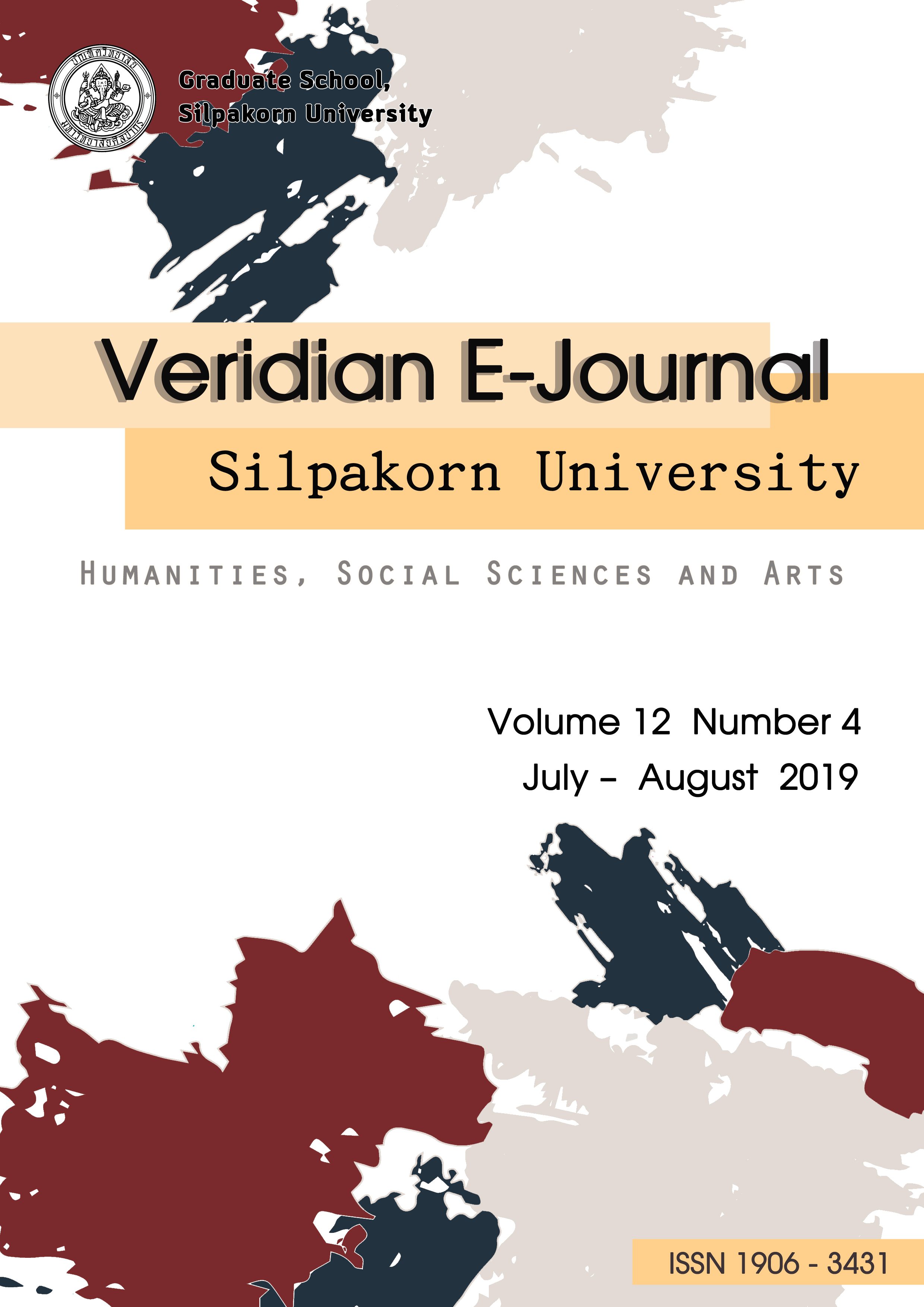โมเดลสมการโครงสร้างของการสนับสนุนเครือข่ายทางสังคมต่อความตั้งใจที่จะเป็นผู้ประกอบการธุรกิจเทคโนโลยีและนวัตกรรมดิจิทัลรายใหม่ด้านการเกษตร ของนักศึกษาด้านเกษตรศาสตร์ (The Structural Equation Model of the Support from Social Network on Agri-Tech Startup Entrepreneurial Intention of Agriculture Students)
Main Article Content
บทคัดย่อ
การวิจัยครั้งนี้มีวัตถุประสงค์เพื่อศึกษาถึง 1) ผลกระทบของปัจจัยด้านการสนับสนุนทางสังคมที่ส่งผลต่อทัศนคติต่อการเป็นผู้ประกอบการ การคล้อยตามกลุ่มอ้างอิง การรับรู้ความสามารถในการเป็นผู้ประกอบการ และความตั้งใจในการเป็นผู้ประกอบการธุรกิจเทคโนโลยีและนวัตกรรมดิจิทัลรายใหม่ด้านการเกษตรของนักศึกษาด้านเกษตรศาสตร์ และ 2) ผลกระทบของปัจจัยด้านทัศนคติต่อการเป็นผู้ประกอบการ การคล้อยตามกลุ่มอ้างอิง และการรับรู้ความสามารถในการเป็นผู้ประกอบการที่ส่งผลต่อความตั้งใจในการเป็นผู้ประกอบการธุรกิจเทคโนโลยีและนวัตกรรมดิจิทัลรายใหม่ด้านการเกษตรของนักศึกษาด้านเกษตรศาสตร์ โดยใช้ระเบียบวิธีวิจัยเชิงปริมาณ และใช้แบบสอบถามเป็นเครื่องมือในการเก็บรวบรวมข้อมูลจากนักศึกษาระดับปริญญาตรีด้านเกษตรศาสตร์ จำนวน 180 คน โดยใช้วิธีสุ่มตัวอย่างแบบสะดวก จากนั้นทำการวิเคราะห์โมเดลการวัด และวิเคราะห์โมเดลสมการโครงสร้างก่อนการทำการตรวจสอบสมมติฐานด้วยวิธีการวิเคราะห์ข้อมูลสถิติแบบเส้นทางกำลังสองน้อยที่สุดบางส่วน (Partial Least Square: PLS) ด้วยโปรแกรมสำเร็จรูป SmartPLS
ผลการวิจัยพบว่า ปัจจัยการสนับสนุนทางสังคมเป็นปัจจัยสำคัญที่ส่งผลเชิงบวกต่อการรับรู้ความสามารถในการเป็นผู้ประกอบการมากที่สุด รองลงมาคือ ทัศนคติต่อการเป็นผู้ประกอบการ และการคล้อยตามกลุ่มอ้างอิง ตามลำดับ นอกจากนี้ การรับรู้ความสามารถในการเป็นผู้ประกอบการยังเป็นปัจจัยสำคัญที่สุดที่ส่งผลเชิงบวกต่อความตั้งใจในการเป็นผู้ประกอบการธุรกิจเทคโนโลยีและนวัตกรรมดิจิทัลรายใหม่ด้านการเกษตรของนักศึกษาด้านเกษตรศาสตร์ รองลงมาคือ ทัศนคติต่อการเป็นผู้ประกอบการ โดยการสนับสนุนทางสังคมมีอิทธิพลทางตรงต่อการรับรู้ความสามารถในการเป็นผู้ประกอบการ ทัศนคติต่อการเป็นผู้ประกอบการ และการคล้อยตามกลุ่มอ้างอิง และยังมีอิทธิพลทางอ้อมต่อความตั้งใจที่จะเป็นผู้ประกอบการธุรกิจเทคโนโลยีและนวัตกรรมดิจิทัลรายใหม่ด้านการเกษตรของนักศึกษาด้านเกษตรศาสตร์ นอกจากนี้ ทัศนคติต่อการเป็นผู้ประกอบการ และการรับรู้ความสามารถในการเป็นผู้ประกอบการยังมีอิทธิพลทางตรงต่อความตั้งใจที่จะเป็นผู้ประกอบการธุรกิจเทคโนโลยีและนวัตกรรมดิจิทัลรายใหม่ด้านการเกษตรของนักศึกษาด้านเกษตรศาสตร์ ในขณะที่การสนับสนุนทางสังคม และการคล้อยตามกลุ่มอ้างอิงไม่มีอิทธิพลทางตรงต่อความตั้งใจที่จะเป็นผู้ประกอบการธุรกิจเทคโนโลยีและนวัตกรรมดิจิทัลรายใหม่ด้านการเกษตรของนักศึกษาด้านเกษตรศาสตร์ โมเดลสมการโครงสร้างสามารถอธิบายผลของความตั้งใจที่จะเป็นผู้ประกอบการธุรกิจเทคโนโลยีและนวัตกรรมดิจิทัลรายใหม่ด้านการเกษตรของนักศึกษาด้านเกษตรศาสตร์ ได้ร้อยละ 63. (R2 =63.00, R2adj =62.20) จากผลการวิจัยเป็นประโยชน์ต่อสถาบันการศึกษา และหน่วยบ่มเพาะวิสาหกิจ และผู้มีส่วนเกี่ยวข้องในการเพิ่มระดับความตั้งใจที่จะเป็นผู้ประกอบการธุรกิจเทคโนโลยีและนวัตกรรมดิจิทัลรายใหม่ด้านการเกษตรของนักศึกษาด้านเกษตรศาสตร์โดยผ่านทัศนคติต่อการเป็นผู้ประกอบการ และการรับรู้ความสามารถในการเป็นผู้ประกอบการที่เกิดจากการสนับสนุนทางสังคม
This research aims to study 1) the effect of social support on attitude towards entrepreneurship, subjective norms, perceived entrepreneurial capacity and agri-tech startup entrepreneurial intention of agriculture students; and 2) the effect of attitude towards entrepreneurship, subjective norms, perceived entrepreneurial capacity on agri-tech startup entrepreneurial intention of agriculture students. The quantitative survey research method is used for this study and the research tool is a questionnaire to collect data from 180 agriculture students as the sample size by convenience sampling. Then analysis the measurement model and structural equation modeling before hypotheses testing by Partial Least Square Structural Equation Modeling (PLS-SEM) with SmartPLS software.
The results found that the social support had the most influential factor that positively effects on perceived entrepreneurial capacity, followed by attitude towards entrepreneurship and subjective norms, respectively. Moreover, the perceived entrepreneurial capacity had the most influential factor that positively effects on agri-tech startup entrepreneurial intention of agriculture students, followed by attitude towards entrepreneurship. Which the social support directly affected perceived entrepreneurial capacity, attitude towards entrepreneurship and subjective norms and indirectly influenced agri-tech startup entrepreneurial intention of agriculture students. In addition the attitude towards entrepreneurship and perceived entrepreneurial capacity directly affected agri-tech startup entrepreneurial intention of agriculture students. While the social support, and subjective norms did not directly affect the agri-tech startup entrepreneurial intention of agriculture students. The structural equation model can explain agri-tech startup entrepreneurial intention of agriculture students at 63 percent (R2=63.00, R2adj =62.20). The results of this research are beneficial to educational institution, business incubator and stakeholder to increase the agri-tech startup entrepreneurial intention of agriculture students through the attitude towards entrepreneurship and perceived entrepreneurial capacity by social support.

